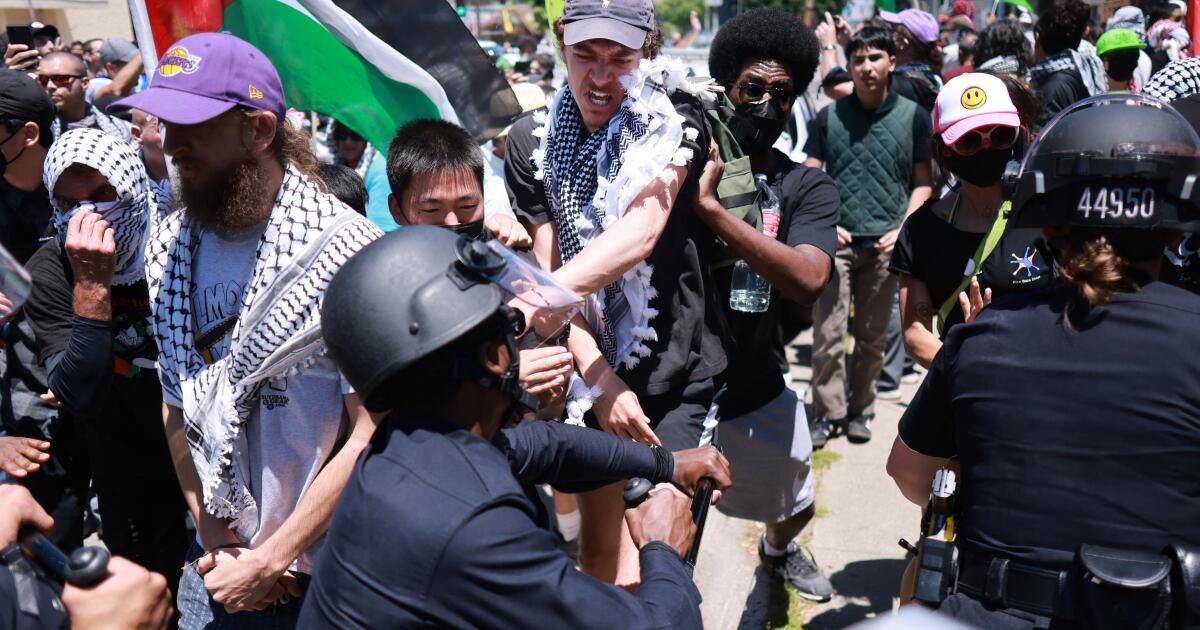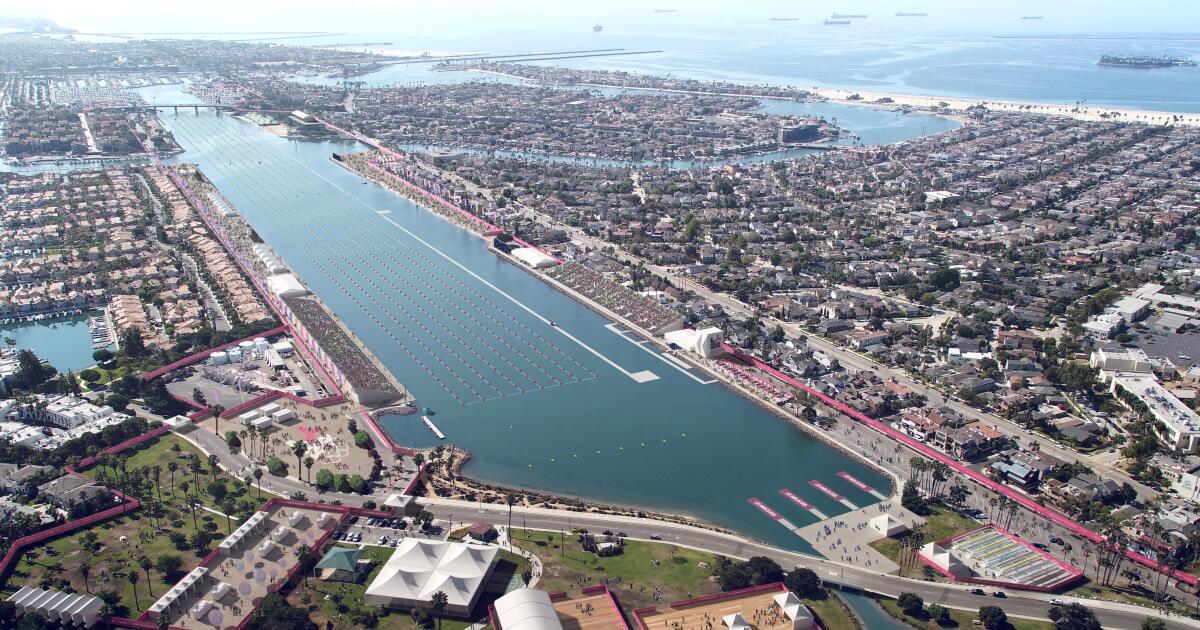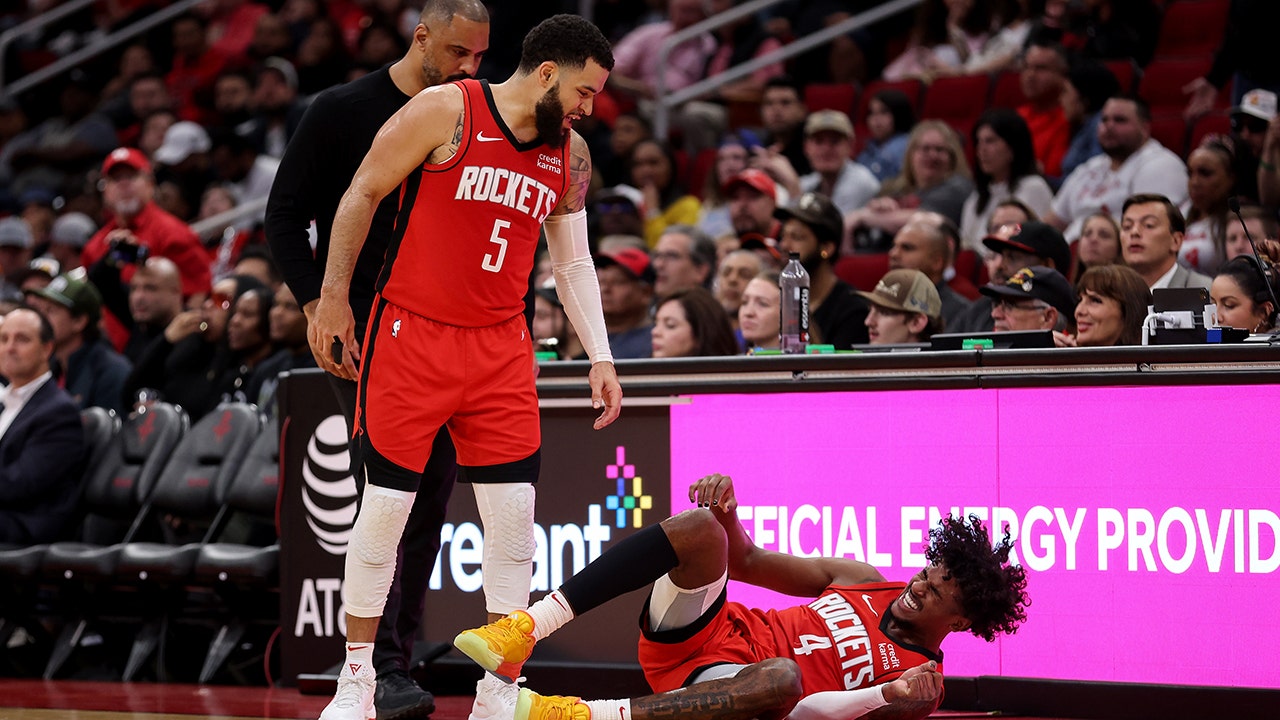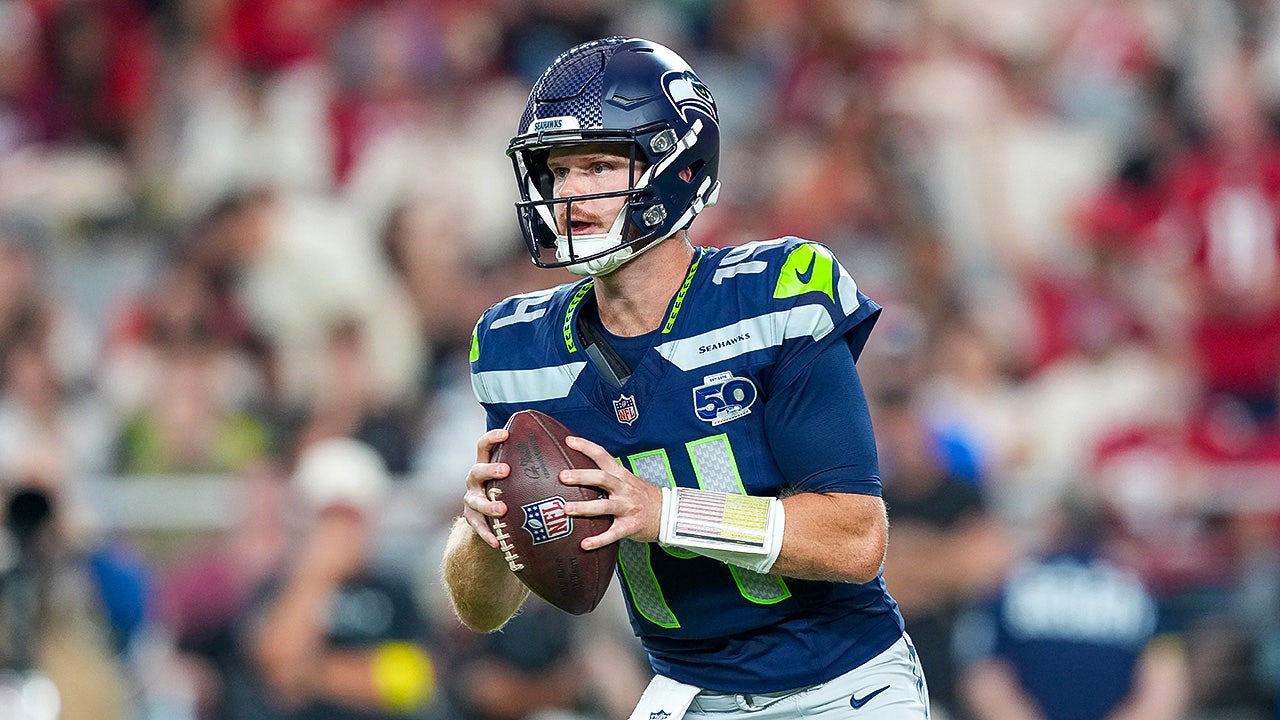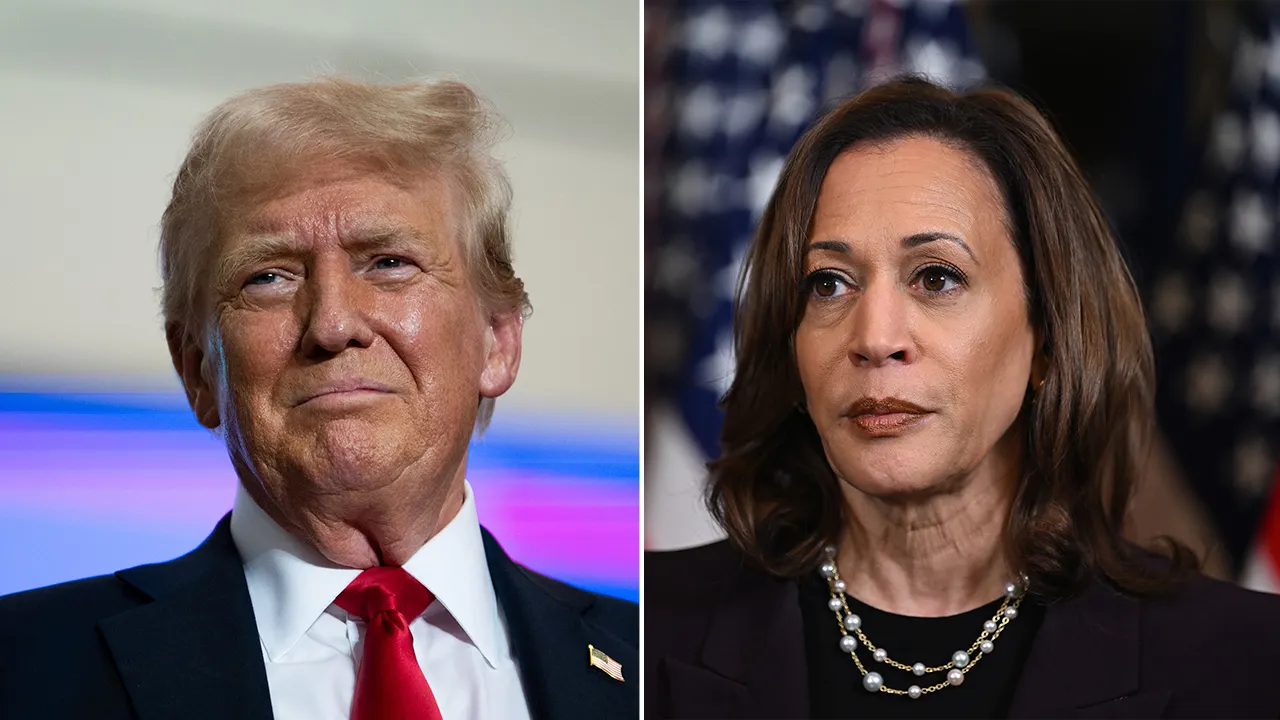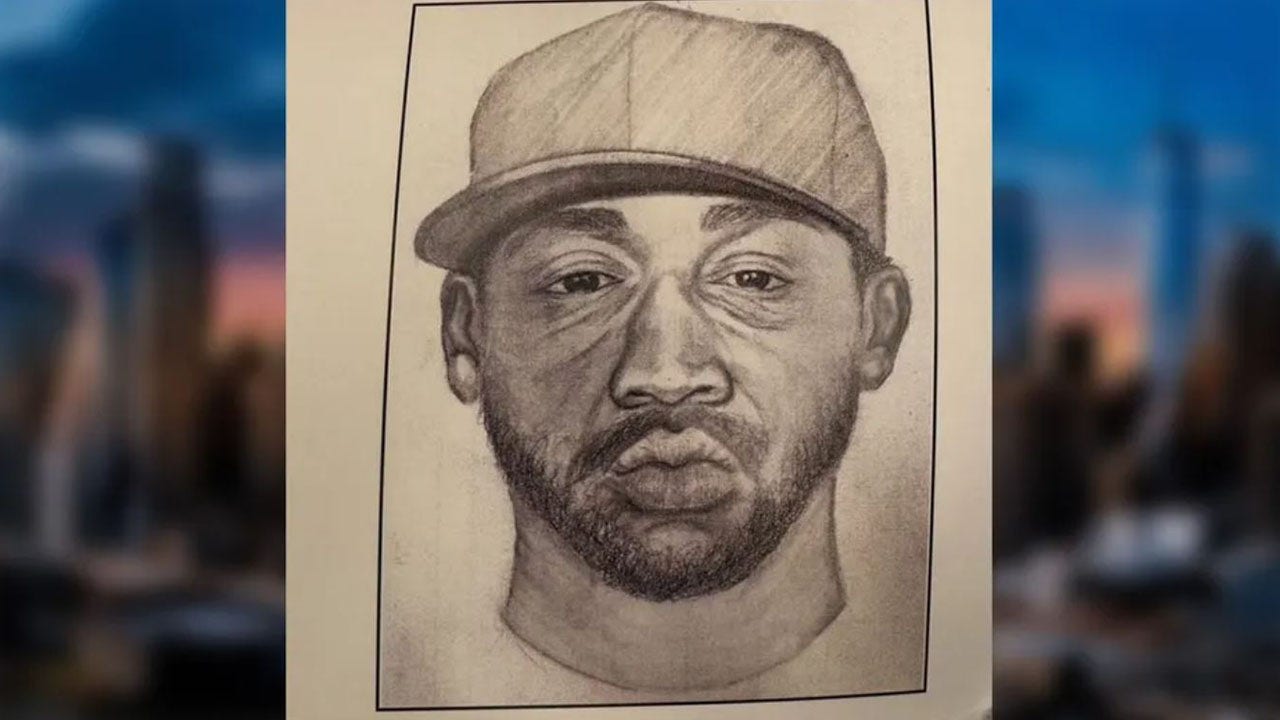Four days after a violent protest outside a Los Angeles synagogue sparked a national furor, more perspectives on what happened are emerging.
The demonstration drew condemnation from national and state elected officials, including President Biden, Vice President Harris and Governor Gavin Newsom.
“Bullying Jewish worshipers is dangerous, unconscionable, anti-Semitic and un-American,” Biden said in a statement. “Americans have the right to peacefully protest. But blocking access to a place of worship and engaging in violence is never acceptable.”
The incident has led to increased police patrols in the area, as well as discussions about restricting the use of masks during protests.
It has also drawn criticism from both pro-Israel and Palestinian camps over police tactics.
A Los Angeles doctor, who asked to remain anonymous for fear of retaliation, worked as a medic during Sunday’s protest outside the Adas Torah synagogue in the predominantly Jewish Pico-Robertson neighborhood. During the hours-long melee, in which violent clashes erupted between pro-Palestine supporters and pro-Israel counterprotesters, he treated at least 11 people, whose injuries ranged from chest pain and difficulty breathing from inhaling pepper spray to a broken arm.
“This was probably the scariest protest I've ever been to,” he said. “It was very evident that our police were not there to protect us and that any act of violence that occurred in front of them would have no consequences. “It was a very traumatic experience and I am still dealing with it.”
The Los Angeles native volunteered to work as a doctor after seeing a protest flyer posted on the Instagram account of the Southern California chapter of the Palestinian Youth Movement. Sunday's melee led politicians and Jewish community groups to condemn the protest outside the religious site as an act of anti-Semitism. Pro-Palestinian supporters, however, say the protest was a direct response to a real estate event at the synagogue that was advertised as information on “housing projects in Israel's best Anglo neighborhoods.”
The advertisement that appeared in Friday's Jewish Journal did not specify the location of the real estate.
According to an archive on the website of My Home in Israel, one of the companies listed in the ad, homes were listed for between $435,000 and $4.1 million in Jerusalem, Tel Aviv and the West Bank territories of Efrat and Ariel. . Much of the international community, including the United States and the UN, says settlements in the West Bank are illegal under international law, which Israel disputes.
On Sunday, the doctor arrived at the synagogue and found protesters gathered near the entrance. Within 20 minutes, Los Angeles police officers showed up and formed two separate lines, one on the east side of the block and one on the west, cutting off access to the area where pro-Palestinian supporters had parked their cars, he said. The protesters were effectively “sandwiched” between the counter-protesters and the police.
“That's when I started to realize how dangerous the situation was,” he said.
Officers began pushing and using batons against protesters to try to disperse the crowd, he said. Pepper spray was used by both protesters and counterprotesters, he said.
LAPD Acting Chief Dominic Choi previously confirmed that a “mobile field force” attempted to disperse the crowd. Choi also said that protesters had “tried to block the entrance to the synagogue.” The LAPD referred questions about the use of force and allegations that they failed to intervene in the violence to a department news release about the protest, which did not address those issues.
The doctor said he treated at least 11 protesters, including seven who had been pepper-sprayed. One woman was splashed three times in the face while she was singing into a megaphone, she said. She cared for another person who complained of chest pain and shortness of breath after inhaling pepper spray. Another suffered a fracture to her right arm after being hit with a police baton, she said.
“There were a lot of people fighting to stay safe,” the doctor said.
Before Sunday's protest, the doctor said he had helped at pro-Palestinian camps at UCLA and USC, volunteering in the medical tent and teaching basic first aid and how to respond to medical emergencies.
The Times spoke to others who witnessed the protest and its aftermath and offered their perspectives.
Rabbi Hertzel Illulian, founder of the JEM Community Center in Beverly Hills, said he arrived at Adas Torah on Sunday to worship during afternoon prayer and was confronted by a group shouting into megaphones. Some visitors to the temple were prevented from entering, he said.
“We couldn't pray properly because the people outside were screaming,” he said.
Jessica Hyam, owner of the Little Tichel Lady clothing store a few doors down from the synagogue, said she had heard about the protest and hired a security guard to stand outside her store. The demonstration started small and in front of Adas Torah, but eventually the sidewalk in front of her store filled up, she said.
His security guard ran in after he was pepper-sprayed, Hyam said.
“It's our home,” he said, “so the fact that they come to a densely populated Jewish area and protest here doesn't seem like part of their cause. It's as if they came and told us: 'We are against you.'”
Sam Yebri, who observed the situation outside the synagogue on Sunday, said attacking places of worship appeared to be a new level of escalation by protesters. Yebri's family prays, eats and shops in the Pico-Robertson community, and his children attend school there, he said.
He arrived outside Adas Torah around 1:00 pm and saw protesters wearing masks and green headbands chanting “Intifada,” the Arabic word for rebellion.
Eden Cohen said a handful of Los Angeles police officers were standing at the entrance to the synagogue, apparently trying to prevent protesters from entering. Her throat and his eyes burned from the bear spray that saturated the air, she said, adding that he saw Jews on the ground after being sprayed with the irritant while others tried to help them.
Cohen said he heard anti-Jewish insults and calls for violence against Israeli soldiers.
“The police weren't really stopping the fights that were breaking out. … It was a chaotic, violent, frightening scene that seemed to be completely out of control,” Cohen said.
Cameraman Sean Beckner-Carmitchel said he was hit in the back of the head by pro-Israel protesters while covering the event. Several men followed him down Pico Boulevard shortly before 4:30 p.m. In the video of him, someone off camera can be heard telling the men that Beckner-Carmitchel was a member of the media.
“It was nothing more than inciting violence,” he said. “No political statements were made.”
After Sunday's violence, those in the pro-Israel crowd also criticized the police for not intervening.
Talia Regev, 43, who said she came to the protest “to make sure things didn't get out of control,” was talking to police officers when, she said, she turned around and saw her friend Naftoli Sherman fall down.
Sherman, 25, told a Times reporter that a pro-Palestinian protester punched him in the left eye. As he fell to the ground, some in the crowd tried to push away the man who had hit him while others tried to pile on top of them. When he finally got up, he was bleeding on the left side of his face and had a broken nose. He approached officers and asked them to call an ambulance or let him through, but they remained at the scene and told him to use the side streets.
Finally, Sherman said, he walked around the police line and went to a nearby hospital, where his nose was restored.
Regev said he came between combatants in an effort to break up fights. He also saw someone grab a chair and was able to convince them not to use it.
A pro-Israel protester carrying a spiked stick was arrested, cited and released, and there were two other reports of assault, according to the Los Angeles Police Department. A pro-Palestinian protester also used a chemical irritant on at least two officers, something the department is investigating, Choi said.
At a public safety briefing Wednesday, Los Angeles Mayor Karen Bass and Los Angeles Police Cmdr. Steve Lurie denied the allegation that police were told to do nothing. Lurie said no official gave the order to LAPD officers to “stand down and slow or stop any action” during Sunday's protest.
Lurie accused those gathered outside the synagogue of displaying “anger, vitriol and violence.” Lurie, police liaison to the city's Jewish community, said local officials should consider whether blocking access to a place of worship during a protest should be seen as an act of hate that could be prosecuted.
“It seems to me that we're moving into an area where that specific action could be considered a hate crime,” Lurie said, “so we're going to investigate what the filing criteria might be for that.”
Councilwoman Katy Yaroslavsky introduced a motion during a Tuesday meeting of the Los Angeles City Council to find more resources for security services at places of worship.

